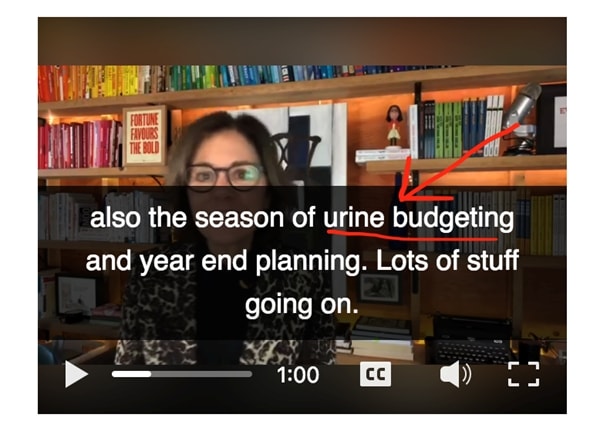Writing is easy. Great writing is almost impossible.
As Seth Godin said:
“If your work isn’t more useful or insightful or urgent than GPT can create in 12 seconds, don’t interrupt people with it. Technology begins by making old work easier, but then it requires that new work be better.”

Above is a screen shot from a video posted by Ann Handley on LinkedIn announcing her earliest-bird pricing for a Marketing Professional Forum.
The captions are robo-generated.
What Ann actually said in the video: “Year-end budgeting”
What the robot heard her say: “??”
Lesson #1? When LinkedIn gives you the option when you post a video: “Do you want to edit the captions?” Always say: YES I DO! Always take an extra few minutes to edit your auto-generated captions.
Off the back of the (incorrect but very funny) auto caption, Ann wrote a post on what AI means for writers. it’s good.
Here’s a snapshot of what she had to say:
AI is a tool.
That’s it. Full stop.
It’s a power tool, sure—maybe a diamond-toothed chainsaw capable of felling a redwood. But it’s also just a tool.
The question becomes: Who is holding the tool? (Hat tip to Mitch Joel – another great article)
You can put a vibrating, live diamond-toothed chainsaw in my inexperienced, unpracticed, ignorant hands and within seconds I will lose control of it and catch my sleeve in the blade and oh my god I just sheared my arm clean off and then in a panic (chainsaw thrashing wildly) I hack off the limbs off anyone standing near me and before I black out I see everything, everywhere is chaos. It’s a bloodbath.
AI tools like ChatGPT remind me of that chaos.
The flurry of activity on social media this past week. The momentum of millions of new ChatGPT accounts. It’s not a exactly a bloodbath—but it’s a lot of wild energy that is fueling both panic and euphoria.
It’s not that you can’t use ChatGPT in useful, substantive ways to be a better writer. Or to write at all: A flummoxed, frozen writer might use it to translate a garbled idea in their heads into a basic listicle or email or meta description.
But what about more than that? What about writers like us? What do we make of it?
It comes down to the fundamental question: Who is holding the tool?
The one holding the tool should treat AI as a party plus-one. AI is the guest we invite into our work, not the one throwing the party.
—
Perfectly put.
Have you used ChatGPT? What are your thoughts? How do you make sure you’re welding the tool correctly?
I’d love to know your thoughts.
Andy.